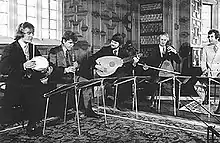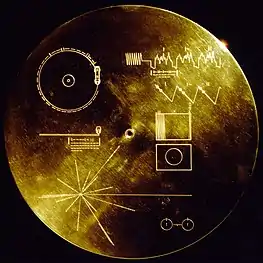Early Music Consort
The Early Music Consort of London was a British music ensemble in the late 1960s and 1970s which specialised in historically informed performance of Medieval and Renaissance music. It was founded in 1967 by music academics Christopher Hogwood and David Munrow and produced many highly influential recordings. The group disbanded in 1976 following Munrow's suicide.
The Early Music Consort of London | |
|---|---|
 The original line-up of the Early Music Consort (left to right: Christopher Hogwood, David Munrow, James Tyler, Oliver Brookes, James Bowman) | |
| Background information | |
| Also known as | The Early Music Consort |
| Origin | UK |
| Genres | Classical, Early music |
| Years active | 1967–1976 |
| Labels | Argo; Vigrin Veritas |
| Past members | David Munrow, Christopher Hogwood, James Tyler, Oliver Brookes, James Bowman |
History
The formation of the Early Music Consort in the late 1960s has been credited with popularising the genre of Early music in UK and being main instigator of the British Early music revival of the late 20th century. Munrow was inspired by the Alte Musik movement that had already gained popularity in Germany, and sought to foster an interest in music of the Medieval and Renaissance eras among British audiences.[1] Munrow collaborated with Christopher Hogwood, with whom he had studied as Cambridge University in setting up a new specialist music group, originally called the Early Music Consort. The group's original line-up consisted of Munrow, a wind instrumentalist who played many different instruments; Hogwood playing keyboard and percussion; Mary Remnant on fiddle, organ and tabor; Oliver Brookes on viol; James Tyler on lute; and the countertenor James Bowman.[2]
Selected discography

The Early Music Consort produced many influential collections of early music, typical of which was The Art of the Netherlands issued as a three-record set in 1976.
A track from their 1976 recording, Instruments of the Middle Ages and Renaissance — "The Fairie Round" from Pavans, Galliards, Almains and other short Aeirs — was selected by NASA for inclusion on the Voyager Golden Record, a pair of phonograph records that were sent into space aboard the Voyager 1 and Voyager 2 space probes in 1977. The piece, written for recorder consort by the English Tudor composer Anthony Holborne, was chosen by a committee chaired by Carl Sagan as a significant example of Western music and a representation of human culture.[3][4]
- Ecco la primavera - Florentine Music of the 14th Cent (1969)
- Music of the Crusades (1971)
- The Triumphs of Maximilian I (1970)
- The Six Wives of Henry VIII (1970)
- Music for Ferdinand and Isabella of Spain (1972)
- The Art of Courtly Love (1973)
- Praetorius - Dances and Motets (1973)
- Music of Guillaume Dufay: Missa "Se La Face Ay Pale" (1974)
- Instruments of the Middle Ages and Renaissance (1976)
- Monteverdi's Contemporaries (1976)
- Music of the Gothic Era (1976)
- Greensleeves to a Ground (1976)
- Festival of Early Music - Music from 14th Century Florence, Music of the Crusades & The Triumphs of Maximilian (1976)
- Henry Purcell: Birthday Odes for Queen Mary (1976)
- The Art of the Netherlands (1976)
References
- Wilson, Nick (2013). "2. Seven Ages of Early Music". The Art of Re-enchantment: Making Early Music in the Modern Age. OUP USA. p. 19. ISBN 9780199939930. Retrieved 20 March 2018.
- "David Munrow (of the Early Music Consort) and Folk Music - Semibrevity". Semibrevity. 1 May 2015. Retrieved 20 March 2018.
- "David Munrow - Biography". www.davidmunrow.org. Archived from the original on 20 March 2018. Retrieved 20 March 2018.
- "Voyager - Music on the Golden Record: Music From Earth". Jet Propulsion Laboratory, California Institute of Technology. NASA. Archived from the original on 20 March 2018. Retrieved 20 March 2018.